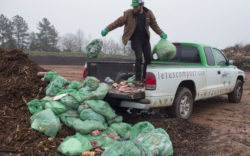After 20 years as a (mostly) vegetarian establishment, Daily Groceries Co-op is talking about selling meat.
Historically, the co-op has always offered little in the way of animal flesh. Exceptions included cat food, some fish and local turkeys at Thanksgiving. Now, its board of directors is talking about bringing in the red stuff.
Some owner-members, however, think the store ought to stay true to its roots.
“I thought, always, that the mission was to have an ethical co-op—one that cared about the food chains, one that cared about the environment,” says Cal Clements, a Daily owner/member who has been involved in the co-op since its inception. “And therefore it made sense that they were generally a vegetarian co-op.”
Previously, Daily functioned under a vision statement that many owner/members feel supported its previous, unofficial vegetarian status. It begins, “Our vision is to operate through practices that are ethically responsive to both the social and environmental conditions of production and the needs of our community.”
However, that statement has been replaced by a more vaguely worded one: “In Athens there will be a thriving, local, cooperative economy; a fun, inspiring place to shop and learn; a hub for community and civic engagement; and a source of excellent food.” This statement places less onus on the establishment to avoid selling certain products, but Clements and his fellow owner-members find legitimacy for their objections in the wording of the previous one.
Last month, Clements started a petition on Change.org entitled “Petitioning Daily Groceries: Stop selling tuna and create a meat-free policy.” His hope is that the co-op will adhere to its mission of environmental consciousness and ethical responsiveness by taking fish out of its coolers and putting its implicit vegetarianism into writing. An excerpt:
“The oceans have been overfished and suffer due to pollution and increasing acidification. It is now widely understood that animal agriculture, whether of the local variety or the industrial mode, is a major contributor of greenhouse gas emissions. The most recent report from the United Nations Environment Program [UNEP] states that, ‘As the global population surges towards a predicted 9.1 billion people by 2050, western tastes for diets rich in meat and dairy products are unsustainable.’ The report concludes that a global shift towards a vegan diet is vital to save the world from hunger, fuel poverty and the worst impacts of climate change. The 2015 Nutritional Guidelines Committee has also ‘left meat and dairy off the plate’ due to the environmental impact of such foods. We urge Daily Groceries to embody its mission to promote progressive cultural transformation by advocating plant-based nutrition.”
As of Sunday night, the petition had 128 signatures. Many signers left comments asking Daily to consider its priorities.
“I’m signing this petition because I would like to live in a world where businesses support ethical practices regardless of the potential gains from unethical practices,” wrote Ansley Silva.
Others beseeched the grocer to consider the environmental implications of contributing to the consumption of animal products. “Meat is cruel to animals, to human health, and the environment. It’s time to move into the future of sustainable eating, for the future of our planet,” wrote Candace Holder.
Still others made unfavorable comparisons between Daily and corporations like Kroger and Whole Foods.
And then there was Edwin Crutchley-Smith, who offered this health #protip: “While tuna is a rich source of mercury, the same health benefits can be obtained by simply huffing the inside of a broken fluorescent light bulb.”
There was at least one naysayer. Someone wrote, “sorry you don’t get to police my food, vegans. Please keep the tuna on hand,” under the moniker “Love Tuna.”
In response to the petition, the Daily board has agreed to field input from owner-members and community members at a public meeting on today at 7 p.m. in the old firehall on Prince Avenue.
According to Delene Porter, who heads Daily’s board of directors, meat is what the people want—and what the people want makes money. Daily conducted a survey in 2014 in which one-third of shoppers identified as vegetarian and half as omnivores. After that survey, the deli began offering tuna sandwiches—which are now, Porter says, a best-selling item.
In 2011, the board turned its eye toward expansion and brought on Andrea Malloy as general manager. Over the last few years, she has worked to get Daily financially sound—most notably by changing the co-op’s structure in 2013. Whereas previously, patrons could join by either donating money or volunteering in the store, now the only membership option is to buy a $100 share. Gone too are the owner-member discounts of years past.
It seems the new system has done the tiny grocer good.
“Today Daily employs 22 people, is working towards living wages, has begun offering paid time off—very rare in retail—and has created three salaried positions which, beginning Apr. 1, will offer health benefits,” Porter boasts. “Daily now carries more products from local farmers and artisans than ever before, and we aim to be an even greater financial resource to our local producers in the future.”
Still, some shoppers worry about the trade-off between expansion and standards.
“The question is, what is the character of the co-op?” Clements says. “This is a pattern that happens with co-ops—they go to a bigger space, and they become kind of like a co-op version of EarthFare. So that’s kind of the question, is where is it going?”
In the past, Clements says, he’s been able to trust Daily as a supplier of ethical products.
“It just made sense because this was supposed to be a caring kind of place,” he says. “And therefore I would never really look at the price tags very closely. I’d think, ‘Well, this is fine, it’s a good cause, they’re really researching and thinking through every item on the shelf.’
“And if there’s something going on that’s oppressive in the chain… then they’re gonna find out about it and get it off the shelf. So the idea that you would then put meat on the shelf is—by its very nature, that is not a caring type of product.”
Among Daily’s priorities, Porter says, are products that are local, organic, sustainably harvested, minimally processed and humanely raised. But one problem, Clements insists, is that you can’t trust labels.
“People want to be ethical in their food choices,” he says. “So they see a label and it says ‘local.’ And they think, “Oh, it’s local—it must be ethical. Because it’s local. Well, there’s a chicken plant right over here. That’s local. Another thing—It’s always local to somebody.
“So maybe, oh, it’s a small family farm that maybe has only 200 dairy cows or 3,000 pigs or something. That’s considered a family farm operation. And it is small by comparison. But that doesn’t mean that it’s humane.”
And, of course, there is the issue of the environment. The meat industry is hugely responsible for greenhouse gas emissions, water waste, and a global maldistribution of grains that makes food access in underdeveloped countries difficult.
“Even the 2015 Nutritional Guidelines Committee has said, ‘Look, meat is not healthy,’” Clements says. “It’s really coming out. And so this time, this co-op that’s had a great reputation for being on the forefront of a cultural transformation towards greater health is going backwards. Supposedly because then they will make more profits and be able to serve more people under the co-op model—with the idea that somehow that model is gonna serve people better than maybe just not selling them products that are gonna harm them.”
Tonight’s meeting could get heated, but in the end, Daily is still a community cooperative.
“I see Daily as a vessel into which all 766-plus of us have poured our dreams regarding food access, quality, labor practices, animal treatment, and many more,” Porter says. “That’s a lot of expectations for one little grocery store to hold, but as a democratic enterprise, we’re up for the challenge.”
Like what you just read? Support Flagpole by making a donation today. Every dollar you give helps fund our ongoing mission to provide Athens with quality, independent journalism.










